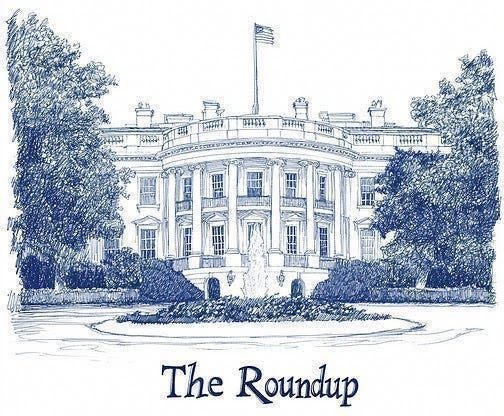Please click here to opt in to receive the Executive Functions Roundup via email and to subscribe to Executive Functions.
The Seventh Circuit Court of Appeals on Saturday granted the government’s request for an administrative stay with respect to the “federalization of National Guard . . . within Illinois” but denied the request with respect to the deployment of the National Guard. (Order.) (WaPo.) See a previous Roundup for background.
A panel of the Ninth Circuit Court of Appeals on Friday declined to rehear Community Legal Services in East Palo Alto v. HHS en banc, leaving in place a district court preliminary injunction that blocked the government from terminating funding for legal counsel representing children in immigration proceedings. (Order.)
Vice President J.D. Vance on Sunday stated that President Trump “has not felt he needed to” invoke the Insurrection Act to deploy the National Guard domestically “right now.” (NYT.)
More than 4,000 federal employees were laid off by the Trump administration on Friday in response to the government shutdown. (WSJ.)
Several major media outlets have refused to sign on to a new Pentagon press policy restricting their communication with military sources, which may result in forfeiture of their press badges. (WSJ.)
Defense Secretary Pete Hegseth announced on Friday that the federal government reached an agreement to construct a training facility for the Qatari military at Mountain Home Air Force Base in Idaho. (AP.)
Molly Roberts contended that the case against New York Attorney General Letitia James is weak. (Lawfare.) The Wall Street Journal Editorial Board warned against the “destructive lawfare” inherent in both the prosecution of James, and of James’s prosecution of President Trump. (WSJ.) The Washington Post Editorial Board similarly noted the resemblance of the cases. (WaPo.) The New York Times Editorial Board argued that the investigations carried out by Democrats targeting Trump “followed a potential crime, not a personal vendetta.” (NYT.)
Benjamin Wittes argued that the arraignment of former FBI Director James Comey exposed an “embarrassing” and “rushed” political prosecution, pointing to the government’s apparent unpreparedness and reliance on federal prosecutors from outside the Eastern District of Virginia. (Lawfare.)
Bill Shipley argued that Comey’s claims of vindictive and selective prosecution will face steep odds as a defense in the Fourth Circuit, which requires clear proof of animus or discriminatory intent and generally defers to prosecutorial discretion. (Shipwreckedcrew.)
In a questionnaire sent to federal judges, 47 out of 65 responders disagreed with the statement: “The Supreme Court has made appropriate use of the emergency docket since President Trump returned to office.” (NYT.) Steve Vladeck criticized those defending the Supreme Court’s behavior on interim docket decisions for not engaging with the substance of critiques against the Court. (One First.) Jonathan Adler criticized the survey design, arguing that “the Times did not seek out a random or representative sample of federal judges, but instead solicited a sample weighted toward those judges most likely to disagree with the Supreme Court.” (The Volokh Conspiracy.)
David Frum outlined key concerns regarding the “hazy details” of the Trump administration’s TikTok deal. (The Atlantic.)
Molly Roberts argued that the Trump administration’s messaging blaming congressional Democrats for the government shutdown pushes the limits of the Hatch Act, but executive branch enforcement of the law is unlikely. (Lawfare.)
David French praised Judge Immergut’s (D. Or.) decision granting a temporary restraining order against the deployment of the National Guard to Oregon, arguing that President Trump has forfeited the great level of judicial deference historically given to the executive branch. (NYT.)
Nicholas Bagley discussed the constitutional issues that would likely arise if the Trump administration continued to pursue most-favored-nation pricing for drugs purchased by Medicare. (Divided Argument.)
Caleb Nelson argued that “the text and the history of Article II are far more equivocal than the current Court has been suggesting” and an originalist interpretation of the Constitution does not compel the inference that the president has unilateral removal power. (Democracy Project.) (NYT.)
Pending Interim Order Applications Involving the U.S. Government in the Supreme Court
Trump v. Orr: The government filed an emergency application on September 19 requesting the Supreme Court to stay an injunction issued by a district court that requires the State Department to allow transgender and nonbinary people to choose the sex designation on their passports. Justice Jackson formally set a deadline of October 4 for a response to the application. Orr submitted a response on October 6, and President Trump filed a reply on October 7.




